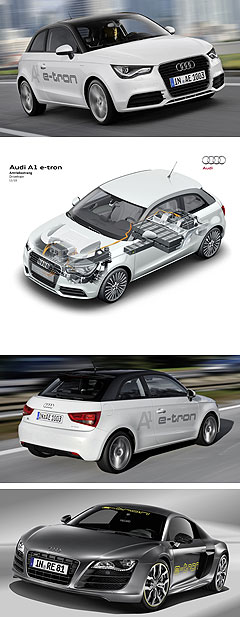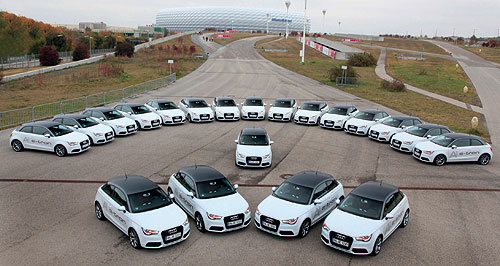Make / Model Search
Future models - Audi - A1 - e-tronPlug-in Audi A1 e-tron not past trial stageTesting: Audi has begun a trial of its A1 e-tron plug-in hybrid across Munich and outlying areas. Audi hands over the keys to 20 A1 e-tron prototypes for fleet trials in Munich3 Nov 2011 AUDI has kicked off a trial of its A1 e-tron plug-in hybrid prototype across Munich and outlying areas with support from two of Germany’s largest energy providers. A fleet of 20 vehicles will utilise what appears to be an extensive charging infrastructure throughout the Bavarian capital installed by rival utility companies E.ON and Stadtwerke Munchen. The trial primarily aims to collect data on driver behaviour, the requirements of electric vehicle infrastructures and the effectiveness of a new communication network between drivers and charging stations using smartphones. Audi has yet to announce when the A1 e-tron will go into production. The Ingolstadt marque remains committed to introducing the flagship electric R8 e-tron sportscar first – probably in 2012 – before trickling its green technology down to the rest of its range. Audi plans to offer at least one electrified variant in each vehicle segment globally by 2020 as part of its ambition to become a world leader in e-mobility. Audi Australia general manager corporate communications Anna Burgdorf told GoAuto this week that several such models will eventually make it Down Under once suitable levels of charging infrastructure are in place.  Left: A1 e-tron. Below: R8 e-tron. Left: A1 e-tron. Below: R8 e-tron.“The Munich trial is just that at the moment trial only,” she said. “Both A1 and A3 e-tron vehicles are certainly going concerns for the brand, however (it’s) likely our first e-tron model for volume production will be the R8 e-tron. “Audi Australia’s position is clear: Electric mobility is the brand’s vision for the future and we will see electric cars in Australia as soon as it is practicable in terms of powering the networks and infrastructure. “I can’t give you an introduction date, but I can certainly say that we will launch electric cars in Australia in the next several years if our road network supports them.” Data gathered during the Munich trial will be analysed by researchers at Technische Universitat Munchen to work out the situations in which people drive EVs, and to what degree, as well as the extent to which this technology will influence the use of other means of transportation. Professor Markus Lienkamp from the university’s department of automotive engineering said: “For researchers, it is no longer a question of whether electric mobility will catch on, but rather when. “Electric mobility constitutes a paradigm shift for companies and society alike. “This fleet trial allows us to learn more about people’s mobility habits under a new set of circumstances.” Audi AG head of electric mobility strategy Franciscus van Meel said the company is planning additional fleet tests in other strategically important markets. The fleet trial is being sponsored by the German ministry of transport, building and urban development as part of its €10 million ($A13.4m) project to turn the city of Munich into a pilot region for electric mobility projects. Audi claims that all the charging stations that comprise the network get their power from renewable sources. Both utility providers taking part in the trial have previous experience in developing commercially viable EV power networks such as the one on Munich. E.ON claims to have conducted more than ten pilot projects across six European countries, including experiments with wireless charging and the development of a system where drivers top-up their car’s battery pack via charging points in multi-level car parks. In this system, the charging point is activated when the driver inserts their parking ticket, which includes the charging fee as well as the parking fee. Stadtwerke Munchen – which also operates electric trams and subway trains – has previously stated its aim to generate enough renewable electricity to supply the entire Munich metro area by 2025. This would make it the first city with more than a million inhabitants to achieve such a target. The A1 e-tron plug-in concept was first revealed at the 2010 Geneva motor show. The prototype’s electric motor produces 75kW of power and 240Nm of torque – on par with base 77TSI petrol-engined variants of the production A1. The car is said to run for 50km solely on electricity before a rotary internal combustion range-extender engine kicks in to recharge the battery and provide an extra 200km of range. Fuel consumption once the range extender is engaged is claimed to be 1.9 litres per 100km, with CO2 emissions of 45g/km. The consumption figure is calculated as per the proposed standard for determining the fuel efficiency of range-extended vehicles. Calculated using a similar formula, GM says the larger Volt can return 1.2L/100km. Chevrolet’s Volt (to be sold here as a Holden from next year) also uses a range extenders where the engine only charges the batteries rather than applying drive to the wheels. Later this month, Audi will add a diesel-powered A1 variant to its local line-up, using a 66kW/230Nm turbo engine to achieve a Toyota Prius-beating official combined fuel consumption figure of 3.8L/100km. Hybrid versions of its A6 and A8 luxury sedans, meanwhile, will be introduced to the Australian market from 2013.  Read more25th of October 2011  Audi seizes A1 diesel advantageDiesel A1 offers sub-Prius fuel consumption as Audi prepares 2012 new model blitz24th of October 2011  Audi confirms hybrids for Oz in 2013Hybrid A6 and A8 sedans on way Down Under as Audi unveils 2020 electrification plan16th of September 2011  Audi attacks BMW’s carbon-fibre eco carEnergy generated to make carbon-fibre BMW i3 would outweigh any benefit, says AudiAll future modelsA1 pricing
Motor industry news |
Click to shareAudi modelsResearch Audi All future modelsA1 pricing
Motor industry news |



 Alfa Romeo
Alfa Romeo Abarth
Abarth Audi
Audi Aston Martin
Aston Martin BMW
BMW Bentley
Bentley Ferrari
Ferrari Chevrolet
Chevrolet Ford
Ford Fiat
Fiat GWM
GWM Foton
Foton Hyundai
Hyundai Honda
Honda Jaguar
Jaguar Isuzu
Isuzu Kia
Kia Jeep
Jeep Land Rover
Land Rover Lamborghini
Lamborghini Maserati
Maserati Lexus
Lexus McLaren
McLaren Mazda
Mazda Mercedes-Benz
Mercedes-Benz Mitsubishi
Mitsubishi Mini
Mini Peugeot
Peugeot Nissan
Nissan Ram
Ram Porsche
Porsche Rolls-Royce
Rolls-Royce Smart
Smart Skoda
Skoda Suzuki
Suzuki Subaru
Subaru Toyota
Toyota Tesla
Tesla Volvo
Volvo Zeekr
Zeekr







Facebook Twitter Instagram